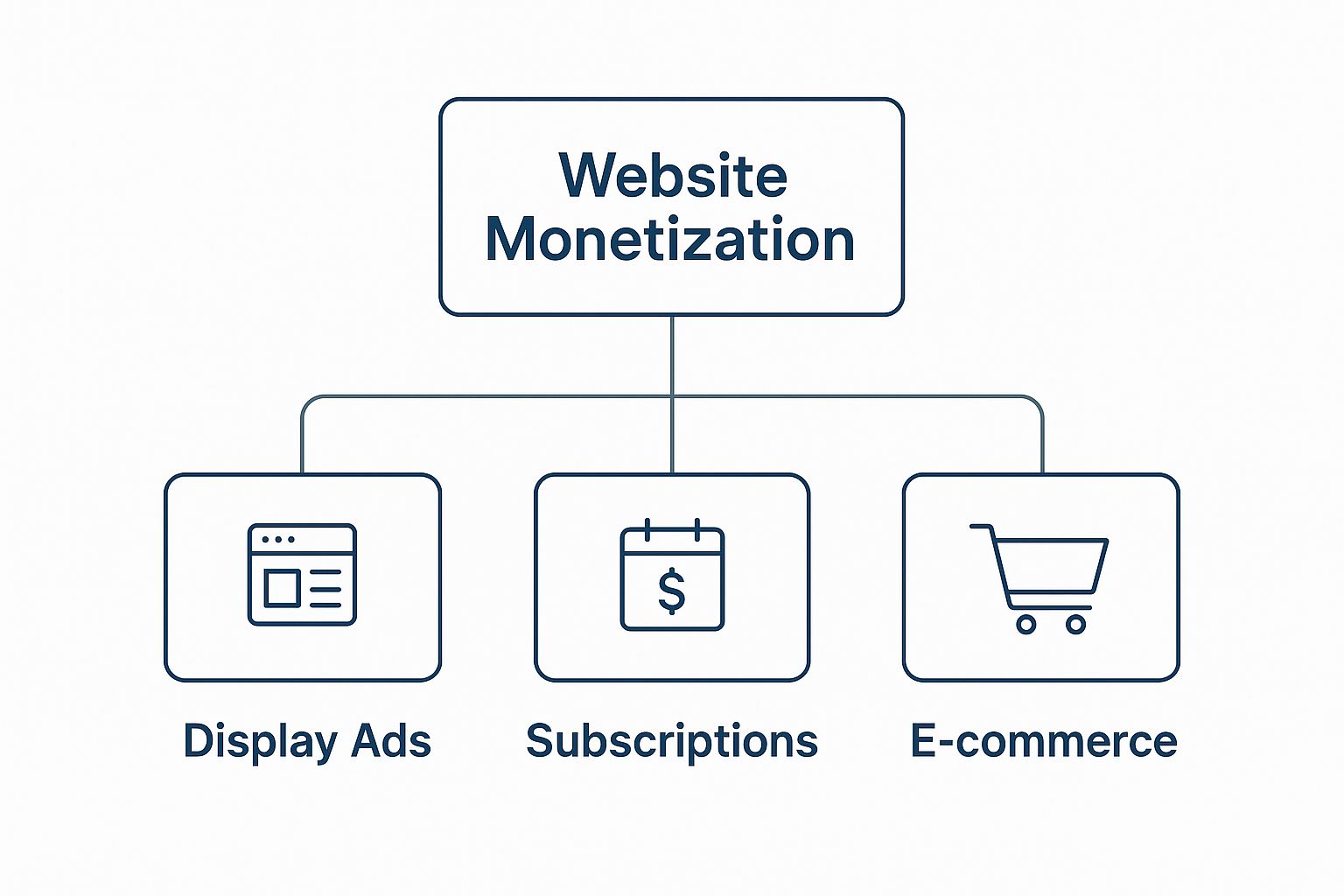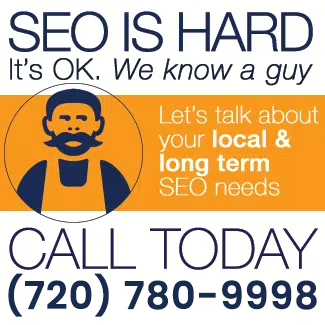It’s a common question: how do websites actually make money? Most people think of display ads, affiliate links, or paid subscriptions. Those methods can work for large blogs and news sites. For a service business, however, the path to a profitable website is much more direct and powerful.
Thinking of Your Website as a Revenue Engine
Many business owners treat their website like a digital brochure. It acts as an online business card, but that’s about it. While a site definitely serves that purpose, it leaves a lot of potential on the table.
The most successful small businesses see their website as an active, hardworking employee. It is a revenue engine that works for them 24/7. Its main job isn’t just to look good; it’s to attract the right customers and turn them into real leads.
For a local service business, making money from a site comes directly from showing off what you do best. You must also give people a simple way to get in touch. This approach is completely different from how content-heavy sites make their cash.
The chart below shows the common monetization models people usually think of. For a local roofer, plumber, or consultant, these are often just distractions.

This visual breaks down how many popular websites earn revenue, but a local service business wins by playing a different sport altogether.
Shifting Your Focus to What Really Matters
Instead of getting sidetracked by complicated tactics like running ads, your focus should be on lead generation.
This means your website has one primary mission: to turn a casual visitor into a phone call or a filled-out contact form. Every single part of your site, from the page layout to the words you use, needs to drive people toward that one goal.
A well-designed website acts as your best salesperson. It builds trust, answers questions, and makes it incredibly easy for interested clients to take the next step.
A professionally built WordPress site is the perfect foundation for this. The platform is built to be search-engine-friendly, which helps more local customers find you in the first place. More importantly, it can be structured specifically to guide visitors toward contacting you. This simple, direct approach is the most effective way for a service business to make money from its website. Getting a handle on some of the essential website statistics for small businesses will only make it clearer how a focused strategy drives real growth.
To give you a clearer picture, let’s compare how service businesses and bloggers approach website monetization. They’re on the same internet, but the rules of the game are completely different.
Website Monetization for Service Businesses vs Bloggers
| Monetization Method | Primary Goal | Best For |
|---|---|---|
| Lead Generation | Capture contact info for a direct sale | Service-based businesses (plumbers, lawyers, consultants) |
| Display Advertising | Earn revenue from ad impressions/clicks | High-traffic blogs, news sites, forums |
| Affiliate Marketing | Earn commission promoting other products | Niche blogs, review sites, influencers |
| Selling Services | Directly sell your own professional services | Freelancers, agencies, local service providers |
| Subscriptions/Memberships | Create recurring revenue from exclusive content | Online course creators, premium content sites, communities |
A blogger is trying to get as many eyeballs as possible to make a few cents per click. A service business, on the other hand, just needs to convince one right person to pick up the phone. It’s about quality over quantity.
Turning your website into a revenue engine starts with having a clear purpose. To really tune that engine, you have to continuously improve sales conversion rate by turning more of your visitors into paying customers. This mindset shift, from a “digital brochure” to a “lead-generating machine,” is the first and most important step to unlocking your website’s true potential.
Generating Leads: The Core Job of a Business Website
If you run a local service business, hearing people talk about making money from a website can sound complicated. You hear about ads, subscriptions, or affiliate links and assume it’s all for big online companies. For a business like yours, the truth is much simpler.
Your website’s most important job, and its main way of making money, is by generating leads.

A “lead” is a potential customer who has shown they are interested. It’s someone who landed on your site, liked what they saw, and took the next step to get in touch. Your website is the digital handshake that kicks off that first conversation.
Make it Easy for Customers to Connect
Imagine walking into a store and needing help, but you can’t find a single employee. You would probably just leave. A website that hides its contact info creates that exact same frustrating feeling.
A good website makes contacting you completely effortless. It does not bury the phone number or make people hunt for a contact form. Instead, it puts those things right where people expect them, clearing a smooth path from a casual visitor to an interested lead.
The easier you make it for someone to contact you, the more likely they are to do it. This simple idea is the foundation of turning a website into a money-making tool for your service business.
Think about it. Someone needs a plumber, and they need one now. They will not spend ten minutes digging through your site for a phone number. They will just click back and go to the next person whose number is right there at the top of the page. Every second of confusion is a lost opportunity.
How a Professional Website Builds Trust
Before anyone picks up the phone or fills out a form, they need to feel like they can trust you. This is where some user psychology comes in. A visitor makes a split-second judgment about your company based on how your website looks and feels.
A professional, clean, and easy-to-use site sends a clear message: you are a credible and trustworthy business. Small details, like a modern design and text without typos, build the confidence someone needs before they hand over their contact info.
This is where a well-built WordPress site really shines. It gives you a professional look that inspires trust and can be designed specifically to guide visitors toward becoming leads. This focused approach is a huge part of any solid strategy for increasing your customer base through affordable web marketing.
The Key Elements of a Lead-Generating Site
So, how does a website actually capture these leads? It’s not about flashy tricks. It is about a few practical elements working together to nudge people to take action.
- Prominent Phone Number: Your number should be one of the first things a visitor sees. Put it right at the top of every single page.
- Clear Calls-to-Action (CTAs): These are buttons and links with simple, direct phrases like “Request a Quote” or “Contact Us Today.” They tell visitors exactly what to do next.
- Simple Contact Forms: Only ask for what you absolutely need. A long, complicated form will make people give up and leave.
- An Uncluttered Contact Page: Your contact page needs to be simple. Phone, email, address, and a basic form. No distractions.
Turning visitors into clients often comes down to using effective lead capture forms that make the process painless. The goal is to make getting in touch so simple and reassuring that visitors do not have to think twice.
That direct line from a good user experience to an increase in quality leads is the most powerful way a service business website makes money. It is not magic; it is just good business.
Showing Off Your Services to Win Over Customers
You have figured out how to get leads to your website. Great. That’s just the first half of the job. Now, your site has to do the real work: convincing those people that your services are the answer they’ve been looking for.
A huge mistake is businesses treating their service pages like a simple menu or a dry price list. If you are in the service game, how you present what you do is a direct way to make money. It is not about being an online store; it is about building persuasive, detailed pages that answer a customer’s questions before they even ask them.

Think of each service page as your best salesperson, working 24/7. Its only job is to explain the benefits, build trust, and prove your value. By the time a customer picks up the phone to call, they should already be sold on the idea that you are the right person for the job.
Speak Their Language, Not Yours
One of the fastest ways to lose a potential customer is to drown them in industry jargon they do not understand. A homeowner looking for a landscaper does not care about the Latin names for plants. They just want to know if you can give them a beautiful, low-maintenance backyard where their kids can play. Your website has to speak their language.
Instead of just listing what a service is, focus on what it does for the customer. Talk about the benefits and the outcome they will get. Shifting from features to benefits is a small change, but it makes a massive difference in helping people connect with what you offer.
For example, a plumber does not just “install tankless water heaters.” They provide “endless hot water and lower energy bills,” which is what the customer is actually buying.
Build Value Before They Even Talk to You
A well-built service page does more than just describe what you do. It builds a rock-solid case for why your business is the only choice. This is your chance to really show off your expertise and justify what you charge, pushing the price tag way down the list of their concerns.
Your website is your chance to control the narrative. By clearly explaining the value and benefits of your services, you frame the conversation around quality and results, not just price.
When a customer gets the full picture of the value you bring, they become a high-quality lead. They are not just price shopping anymore; they are looking for the right partner to solve their problem. This is how a website directly contributes to your bottom line. A professionally designed WordPress site gives you the perfect framework to lay all this out clearly.
The Power of a Smart Service Structure
How you organize your services on your site matters. It’s not just for your visitors, but for search engines, too. A confusing layout is a recipe for frustration and a quick click of the “back” button.
A logical structure, on the other hand, helps people find exactly what they need without any guesswork. It also sends clear signals to Google about what your business is an expert in, which is huge for showing up in local searches. If you offer more than one service, this is not optional.
Here are four big wins from organizing your services logically:
- A Better User Experience: People find what they need, fast. No getting lost, no confusion.
- A Clearer Business Focus: It shows you have a defined set of specialties, which builds trust in your expertise.
- Improved Search Engine Visibility: Google can easily figure out what you do, helping you rank for specific keywords people are searching for.
- Higher Conversion Rates: When people can find and understand the service they need, they are far more likely to take the next step and contact you.
Showcasing your services is a core part of how a website makes money for a small business. When you present what you offer in a clear, benefit-focused, and well-organized way, your website becomes an active, persuasive tool that brings in the right kind of customers.
Building Authority and Trust with Helpful Content
So far, we have talked about how your website directly pulls in business. It can showcase your services and make it easy for people to call you. But there is another way your site can make money, one that is less direct but powerful over the long haul. It is all about creating genuinely helpful content.

When we say “content,” do not picture a big media company trying to make a few cents off ads. For a local service business, helpful content means writing articles or guides that answer the real questions your customers are asking every day. This simple act positions you as the go-to expert in your field.
By giving away solutions and advice for free, you build something that money cannot buy: trust. When people see you as a reliable source of information, who do you think they will call when they finally need to hire a pro?
Turning Your Expertise into Qualified Leads
Think about it this way. A local plumber could write a quick guide on how to keep pipes from freezing in the winter. A homeowner, stressed about an upcoming cold snap, finds that article. They follow the advice, it works, and they immediately see that plumber as an authority who knows their stuff.
A few months later, a pipe bursts. Who are they going to call? Some random company from a Google search, or the expert who already helped them out for free? This is how you turn content into a lead-generating machine.
This strategy does not make money from clicks or ads. Instead, it brings the right people to your website—people who are actively looking for the exact expertise you offer.
Helpful content is like planting a tree. It might not provide shade overnight, but over time, it grows into a massive asset that consistently brings valuable opportunities to your doorstep.
A professional WordPress site is the perfect foundation for this. It gives you a clean, easy-to-read blog where you can publish your knowledge, get found by customers on search engines, and turn what you know into a steady stream of business.
Why Content Is a Cornerstone of Modern SEO
Creating this kind of material is the heart of good Search Engine Optimization (SEO). Google’s entire goal is to give its users the best, most useful answers to their questions. When your website does that, Google rewards you.
By consistently publishing articles about your trade, you send clear signals to Google that your site is a hub of expertise. This helps you rank higher in search results, not just for the blog topics, but for your main services, too.
It is crowded out there for small businesses. In 2023, over 73% of U.S. small businesses had a website. With more than 81% of shoppers researching online before they buy, you have to be visible. While many businesses just run ads, a content-first strategy helps you build real authority and stand out from the noise. You can discover more small business website insights on wix.com.
A solid SEO plan almost always involves creating and sharing helpful content. It is a powerful cycle: good articles attract visitors, which boosts your search rankings, which brings in even more potential customers.
How to Get Started with Content for Your Business
Getting started does not need to be complicated. Just put yourself in your customers’ shoes. What do they ask you all the time? What problems are they trying to solve on their own before they call you?
Here are a few simple ideas to get the ball rolling:
- Answer FAQs: Take the questions you hear every day and turn each one into a detailed blog post.
- Create ‘How-To’ Guides: Write simple, step-by-step instructions for a basic task in your field that a beginner could follow.
- Explain Industry Stuff: Break down a complex topic into plain English. This shows off your knowledge without being intimidating.
- Share Maintenance Tips: Give advice on how customers can take care of the work you did for them. This keeps you top-of-mind and reinforces your value.
This approach changes your website from a simple online brochure into a genuinely useful resource. It is an investment in your reputation that pays for itself by attracting better leads who already feel like they know and trust you. If you need a hand getting started, our guide on how to write website content offers a great roadmap for turning your expertise into articles that work.
Why WordPress is the Smart Choice for Your Business
Picking a platform for your business website is like choosing the foundation for your house. If you get it right, you have a solid base that can support you for years. But if you get it wrong, you could be stuck with expensive fixes down the road.
For any small business owner who wants their website to actually make them money, WordPress is that solid foundation. This is not about getting tangled up in tech talk. It is about making a smart business decision. There is a reason the pros use it: WordPress is powerful, flexible, and built to grow with you.
A Platform That Grows With You
Your business will not look the same in five years as it does today, so your website should not be built on a platform that keeps you stuck. WordPress scales beautifully. This means it works just as well for a simple site today as it will for a site with a huge blog and a massive work portfolio later on.
You need your website to bring in leads. The flexibility of WordPress means you can build a site designed specifically to grab a potential customer’s attention and steer them straight to your contact form. It is the perfect starting point for all the SEO and lead generation work that makes your phone ring.
Choosing a website platform is not just a technical decision. It is a business strategy that decides how well your site can actually earn you money.
When you start with WordPress, you are setting yourself up with a system that will not get in your way when you start succeeding.
There’s a Reason It’s the Professional Standard
There are many website builders out there, but WordPress is the engine running a massive chunk of the internet. Because so many people use it, it is always getting better, and there is a huge community of support behind it. It gives you a professional base that both your customers and the search engines already know and trust.
The online economy runs on reliable platforms and the hosting that keeps them online. The global web hosting market is expected to reach $157.9 billion by 2024 and could pass $345 billion by 2028. That giant industry is what allows a small business to build a digital storefront that brings in real revenue. You can read more about these website statistics on rebootonline.com.
A professionally built WordPress site, handled by someone who gets what a small business needs, makes sure your piece of the internet is built the right way. It gives you a reliable, secure, and effective tool that is designed to grow your business. For any owner who’s serious about putting their website to work, it is simply the smart, forward-thinking choice.
Ready to Build a Website That Actually Works?
We have spent this whole guide talking about the different ways a website can make money. The truth is, none of it matters if your site is a confusing, amateur-looking mess. The real answer is not about chasing a single revenue model. It is about building a professional, hardworking online presence that turns curious visitors into actual customers.
A well-built website is more than just a digital brochure; it is a machine designed to generate leads and grow your business. It is your best salesperson, your front door, and a core business asset, all rolled into one. Getting a site to that point takes more than a few clicks.
Why the DIY Approach Usually Fails
The path from a website to a profitable business is paved with smart decisions. It requires knowing what makes people trust you, what Google needs to see to rank you, and how to create a simple path from a first click to a phone call.
When you try to piece this all together yourself, you often end up with a site that looks cheap or sits there doing nothing. This is where getting help from a professional makes all the difference. Someone who lives and breathes this stuff can build the revenue engine you actually need.
Your website is a direct reflection of your business. Paying a professional to build it is not an expense—it is an investment in an asset that works for you 24/7.
Partnering with an expert means you get a site built on a solid platform like WordPress, designed to attract local customers, and built from the ground up to get people to take action. It is a strategic move that turns your website from just another URL into the heart of your growth plan.
Let’s Build Your Most Valuable Business Asset
Your time is better spent running your business, not fighting with confusing website builders or trying to become an SEO expert overnight. A good partner handles all the technical headaches, freeing you up to do what you do best—serving your customers.
The goal is simple: a website that not only looks great but works like a reliable lead-generation machine. By working with a professional, you are making a choice to build something of lasting value that will support your business for years. This is how you stop just having a website and start making money with one.
At The Affordable Web Guy, we specialize in building these kinds of hardworking websites for businesses just like yours.
A Few Common Questions
Getting your head around how a website can actually make you money is the first real step. Here are some of the most common questions from small business owners trying to turn their site into a tool that works for them.
Is It Better To Run Ads or Just Focus on Leads?
For any service business, the answer is almost always to focus on getting leads. Simple as that.
Running ads on your site might bring in a few extra bucks, but it comes at a huge cost. Ads clutter up your site, make you look less professional, and distract visitors from the one thing you actually want them to do: hire you.
The real money comes from landing one new client, which could be worth hundreds or even thousands of dollars. The pocket change you might get from ad clicks just can’t compete. A clean, professional website focused on getting a visitor to call you or fill out your contact form is a much smarter way to make money.
How Quickly Can My Website Start Making Money?
A new website, if it is set up right, can start bringing in leads almost immediately.
The key is making it simple for people to find what they need and get in touch without any hassle. A professional design that builds trust and has clear “call us now” or “get a quote” buttons is what turns a visitor into a real business opportunity.
Building a steady flow of leads from search engines (SEO) takes more time. Think of it in two phases: you will get some leads right away from people you send to the site, but the real, long-term stream of leads will grow as more people start finding you on Google. You need both to really grow.
Do I Need a Blog on My Service Business Website?
You do not need one on day one, but adding a blog is one of the most powerful things you can do to make your site more profitable over the long haul.
A blog is your chance to share what you know. This builds trust with potential customers before you have even had a conversation.
More importantly, every helpful article is a new doorway for your business to be found on Google. When you answer common customer questions in your blog posts, you attract people who are actively looking for the exact solutions you offer. It sets you up as the go-to expert and consistently brings new leads right to your doorstep.
At The Affordable Web Guy, we build professional, hardworking WordPress websites designed specifically to generate leads for small businesses. If you’re ready to turn your site into a true business asset, contact us to get started.

